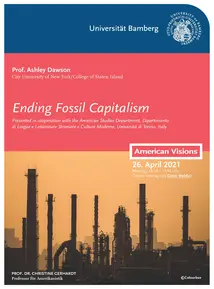Prof. Ashley Dawson (City University of New York/College of Staten Island): "Ending Fossil Capitalism"
Monday, 26.04.2021, 4-6 p.m., online (via Cisco WebEx)
In cooperation with the American Studies Department, Dipartimento di Lingue e Letterature Straniere e Culture Moderne, Università di Torino, Italy
With the electoral defeat of Donald Trump and his subsequent coup attempts, social movements in the US vanquished climate denialism. The Biden administration immediately canceled some of Trump’s most odious environmental policies, but the climate/energy emergency in Texas in late February underlined the dramatic material and ideological challenges the US confronts as it seeks to slash in carbon emissions. What are the prospects and best strategies for struggles to defeat fossil capitalism in the US? In this presentation, Prof. Dawson assessed the outlook for top-down, state-led initiatives like the Green New Deal, and explore alternatives such as what I term the urban climate insurgency. Above all, she argued, climate activists must challenge the idea that wealthy nations like the US simply need to switch from fossil fuels to renewable power while clinging to capitalist/colonial models of incessant growth – an attitude that she calls green capitalist realism. To escape from our current trajectory towards planetary ecocide, in other words, movements must not just overcome fossil capitalism but the green capitalist realism that underpins structures of fossil feeling.
Ashley Dawson is Professor of Postcolonial Studies in the English Department at the Graduate Center/City University of New York and the College of Staten Island. He is the author of numerous books, including People’s Power: Reclaiming the Energy Commons(O/R, 2020), Extreme Cities: The Peril and Promise of Urban Life in the Age of Climate Change (Verso, 2017), and Extinction: A Radical History (O/R, 2016). A member of the Social Text Collective and the founder of the CUNY Climate Action Lab, he is a long-time climate justice activist. He is currently at work on a book entitled Environmentalism from Below and, with the Environmental Humanities Lab in Stockholm, on the creation of a global network of organizations devoted to radical people’s planning for climate action. (website)
